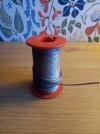DanielT
Major Contributor
Quote from this part of the article below. In that link you can see how the values of the capacitors were measured and how much they deviate from spec/tolerance. The question is whether it is possible to generalize and say this:
As one can see from the test results about 30% of all original electrolytic capacitors removed from the power amplifier board exceed a factory capacitance tolerance. Some e-caps have relatively high ESR values. I also noticed that many of the original capacitors are leaky and have corrosive leads due to electrolyte leakage. All of these observations show the importance of replacing the electrolytic capacitors in any vintage gears because they are most susceptible to aging and degradation.
Is it true? What do you think who have knowledge and experience of refurbishing and replacing electronic components in vintage gears? Or is the Technics SU-7300 on which the recap was conducted in ...better...or worse.. condition than other vintage amplifiers of the same age class? You don't know, for example, how many hours it has been used over the decades and thus worn out the electronics.
In any case, it may be worth thinking about if you are considering buying vintage, even when you read tests on vintage stuff that is tested here at ASR. That is, its condition determines the results so it would be difficult to interpret the results. Or what do you think?



 www.olegvintageaudio.com
www.olegvintageaudio.com
As one can see from the test results about 30% of all original electrolytic capacitors removed from the power amplifier board exceed a factory capacitance tolerance. Some e-caps have relatively high ESR values. I also noticed that many of the original capacitors are leaky and have corrosive leads due to electrolyte leakage. All of these observations show the importance of replacing the electrolytic capacitors in any vintage gears because they are most susceptible to aging and degradation.
Is it true? What do you think who have knowledge and experience of refurbishing and replacing electronic components in vintage gears? Or is the Technics SU-7300 on which the recap was conducted in ...better...or worse.. condition than other vintage amplifiers of the same age class? You don't know, for example, how many hours it has been used over the decades and thus worn out the electronics.
In any case, it may be worth thinking about if you are considering buying vintage, even when you read tests on vintage stuff that is tested here at ASR. That is, its condition determines the results so it would be difficult to interpret the results. Or what do you think?

Technics SU-7300 Stereo Integrated Amplifier Restoration
Technics SU-7300 Stereo Integrated Amplifier Restoration

